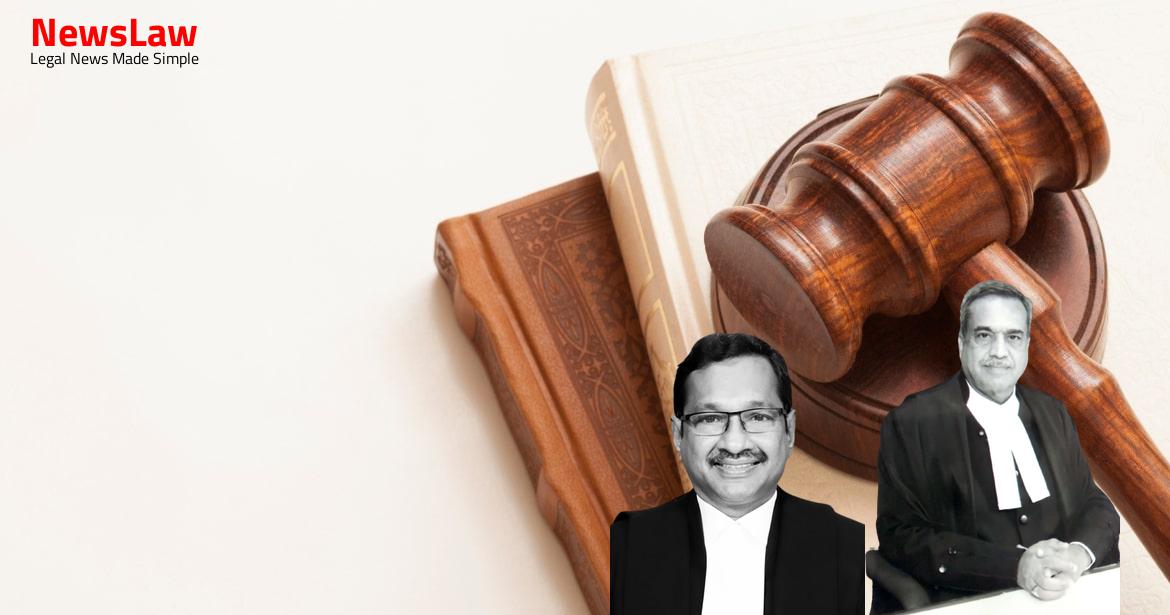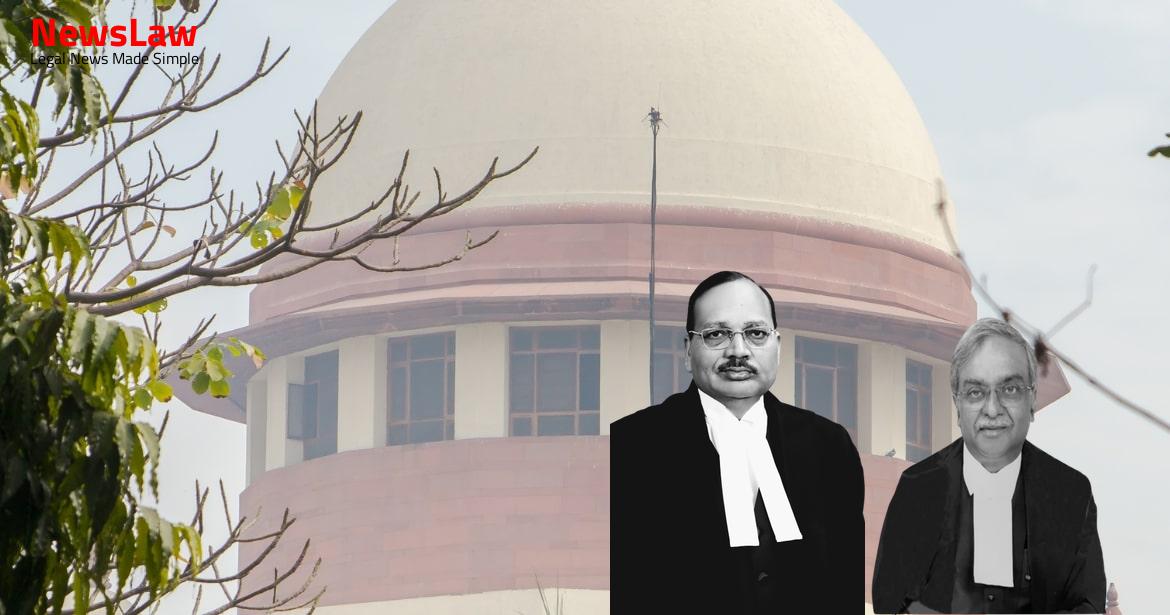Explore the recent Supreme Court of India judgement regarding the limitation for recognition of grant of probate or letters of administration in the case of Ramesh v. The State of Maharashtra. The court delved into complex legal nuances surrounding probate issues, applicability of the Limitation Act, and the significance of timely legal actions. Stay informed about the legal developments in this intricate case.
Facts
- Ramesh claimed that neither he nor his family had notice of the administration petition, arguing that the petition was time-barred under Article 137 of the Limitation Act, 1963.
- Ramesh filed an application for revocation on 29.07.1999, alleging non-compliance with court directions regarding inventory and accounts.
- Allegations were made that the letters of administration were obtained fraudulently, contrary to the law, and with suppression of facts.
- Ramesh’s application for cancellation of the probate was withdrawn on 4 01.04.1998.
- Issues were raised regarding the establishment of Bhagwant Mukti Ashram and the mutation of its name in revenue records.
- An unsuccessful appeal was made to the Division Bench regarding the probate proceedings of Antoinette’s will.
- A petition for grant of letters of administration in Maharashtra was filed, emphasizing the charitable intentions of the testatrix and her husband.
- The application for cancellation of probate was deemed time-barred even after excluding the period of notice of motion.
- Challenges were raised concerning the appointment of the LOA holder as executor and the lack of notice in probate proceedings from the Superior Court of California.
- Discovery of the LOA holder’s actions came when applying for mutation of name at the Rural Gospel and Medical Mission of India, leading to later investigations in court records.
- The probate granted by the competent court is conclusive unless revoked.
- No evidence can be admitted to impeach the probate except in revocation proceedings.
- The Division Bench rejected the appeal stating that the law does prescribe a limitation for cancellation of letters of administration.
- Ramesh had no notice of the proceedings for grant of letters of administration initially.
- The revocation petition was filed beyond the three-year period, making it time-barred.
- Ramesh was not an heir of the deceased according to his admission.
- The application for revocation was rejected by the Single Judge due to being time-barred.
- The proceedings are covered by Article 137 of the Limitation Act, requiring the application to be filed within 3 years from accrual of the right to apply.
- No challenge was made to the original probate granted by the California court, rendering the ancillary grant irrelevant as it was to give effect to the original probate.
Also Read: Urs Family Property Dispute: Supreme Court Decree
Issue
- The issue at hand is whether there is any limitation prescribed for the recognition of grant of probate or letters of administration.
- In case no limitation is prescribed, the residuary provision under Article 137 of the Limitation Act, 1963 applies.
- The starting point for limitation under Article 137 is the date of alleged knowledge of the grant of letters of administration.
Also Read: Land Acquisition Proceedings: Declaration of Lapse under Section 24(2) of the 2013 Act
Arguments
- Letters of administration were granted by the court after due notice and citation.
- The grant of letters of administration was in rem, meaning it operated against the entire world.
- Counsel for the respondent urged the court to dismiss the appeal.
Also Read: Supreme Court Ruling on Exemption of Excise Duties and Cess
Analysis
- An application for grant of probate or letters of administration is not an action in law but an action in rem.
- The grant of probate by a Competent Court operates as a judgment in rem and is valid against the world.
- Probate operates from the date of the grant for the purpose of limitation under Article 137 of the Limitation Act.
- The right to apply for probate accrues on the date of death of the testator.
- Once probate is granted, it binds not only parties to the proceedings but also others not involved in the proceedings.
- Article 137 of the Limitation Act applies to applications for grant of probate.
- Applications contemplated under Article 137 are not confined to the Code of Civil Procedure, 1908.
- Probate or letters of administration is conclusive proof of legal character worldwide.
- Sections 4 and 5 of the 1963 Limitation Act address expiry and extension of prescribed periods in court applications.
- Various scenarios where probate issues have arisen are detailed.
- The limitation period under Article 137 begins from the Appellant’s attainment of majority.
- Applications seeking recognition from the court are deemed as a continuing right.
- Comparison of the 1908 and 1963 Limitation Acts regarding specified and other applications.
- Rejection of the appellant’s application for cancellation of letters of administration.
- Application of Article 137 to petitions for grant of letters of administration.
- Clarification that Article 137 applies to any petition or application to a civil court under any Act.
- Dissenting from the view in the Athani Municipal Council case, confirming the broad applicability of Article 137.
- Just cause for revocation or annulment of a grant of probate or letters of administration is deemed to exist under specific circumstances.
- Examples of just causes include defective proceedings, fraudulent obtaining of the grant, making false suggestions, concealing material information from the Court, untrue allegations of essential facts, uselessness of the grant, and willful omission or untrue exhibition of inventory or account.
- The Indian Succession Act, 1925 does not specify a period of limitation for probate grants or applications for cancellation.
- Article 137 of the Act allows for a three-year limitation period for proceedings without specified time limits.
- Section 228 allows for the administration of a copy of a Will proved abroad in a Court of competent jurisdiction.
- This part provides guidelines for the process of applying for probate or letters of administration, including required particulars in the petition and jurisdictional considerations.
- Appellant failed to provide a satisfactory explanation for not approaching the Court within the period of limitation
- No evidence was produced to prove that the Will was a result of fraud or undue influence
Decision
- The petition for revocation of the letters of administration was filed on 29.7.1999 and was time-barred.
- The notice of motion in the disposed of proceeding was filed on 29.03.1997 and withdrawn on 01.04.1998.
- The original grant of the ancillary letters took place on 25.11.1994, constituting notice to all concerned, and remained unchallenged until the application for revocation.
- No acceptable explanation was provided for the significant delay of 31 years in approaching the court for cancellation or revocation of the grant of probate.
Case Title: RAMESH NIVRUTTI BHAGWAT Vs. SURENDRA MANOHAR PARAKHE
Case Number: C.A. No.-001399-001399 / 2010



